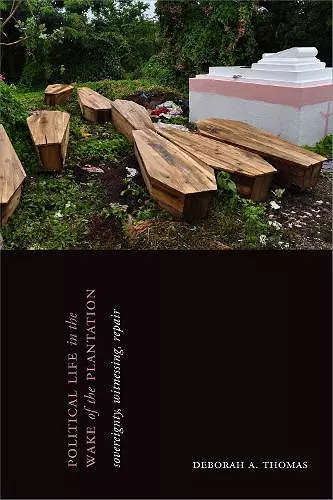Political Life in the Wake of the Plantation
Sovereignty, Witnessing, Repair
Format:Paperback
Publisher:Duke University Press
Published:8th Nov '19
Should be back in stock very soon

In 2010, Jamaican police and military forces entered the West Kingston community of Tivoli Gardens to apprehend Christopher “Dudus” Coke, who had been ordered for extradition to the United States on gun and drug-running charges. By the time Coke was detained, somewhere between seventy-five and two hundred civilians had been killed. In Political Life in the Wake of the Plantation, Deborah A. Thomas uses the incursion as a point of departure for theorizing the roots of contemporary state violence in Jamaica and in post-plantation societies in general. Drawing on visual, oral historical, and colonial archives, Thomas traces the long-term legacies of the plantation system and how its governing logics continue to shape and replicate forms of violence. She places affect at the center of sovereignty to destabilize disembodied narratives of liberalism and progress and to raise questions about recognition, repair, and accountability. In tying theories of politics, colonialism, race, and affect together with Jamaica's history, Thomas presents a robust framework for understanding what it means to be human in the plantation's wake.
“In this ambitious, methodologically innovative, remarkable book, Deborah A. Thomas offers a startlingly original engagement with the affective circuits supporting life in Jamaican neighborhoods that are ongoing sites of state-based violence, covert geopolitical intrigue, and narcopolitics. Through all this, Thomas argues for the power of a redemptive politics and offers a guide to how life after the plantation informs the present.” - Joseph Masco, author of (The Theater of Operations: National Security Affect from the Cold War to the War on Terror) “With an exemplary humanity and grace interwoven with a critical and reparative hopefulness, Deborah A. Thomas's Political Life in the Wake of the Plantation meditates on the fateful violences of postcolonial sovereignty. Across the arc of the book's specific preoccupations, Thomas pursues a receptive sensibility to dimensions of cultural, political, and moral life very often obscured by the conventions of disciplinary investigation, and in so doing she offers us not only a revisionary story of the Jamaican past in the present but a model of restorative thinking.” - David Scott, Columbia University “This is a powerful and persuasive remapping of the contours of black lifeworlds and sovereignty under colonial and national rule and in the face of brutal state violence. Deborah A. Thomas is innovative and creative in her insistence that only alternative archives will reveal the importance of black refusal and significance of affect, and she is passionate in her arguments for ethical practices of witnessing. A remarkable book that should be read by everyone who thinks black life matters.” - Hazel V. Carby, Yale University "Witnessing Jamaica with an affective register provides an essential standpoint from which to recognize African diasporic people’s lived reality, and compels us to reimagine-affectively-the possibilities for social repair. Recommended. Researchers and faculty." - R. Chopra (Choice) "Political Life’s imaginatively choreographed structure . . . complicates understanding of the Jamaican state and state violence. It deepens appreciation of the coformation of citizenship and the state, and the state’s imbrication in both transnational and local sociocultural and political processes." - Charles V. Carnegie (New West Indian Guide) "As an illuminating genealogy of the Jamaican present, it is a must-read for students of Anglophone Caribbean societies, and a model for dealing with both the old and the new as they shape the early twenty-first century. But Political Life is much more than a Caribbeanist’s trove of treasures. As a sharp engagement with recent and classic scholarship, woven through with a thoughtful meditation on ethnographic method, it will form a lasting resource and a generative touchstone for any anthropologist interested in affect, modern citizenship, political theory, postcolonialism, race, or state violence." - Edward Sammons (Anthropos)
ISBN: 9781478006695
Dimensions: unknown
Weight: 612g
368 pages